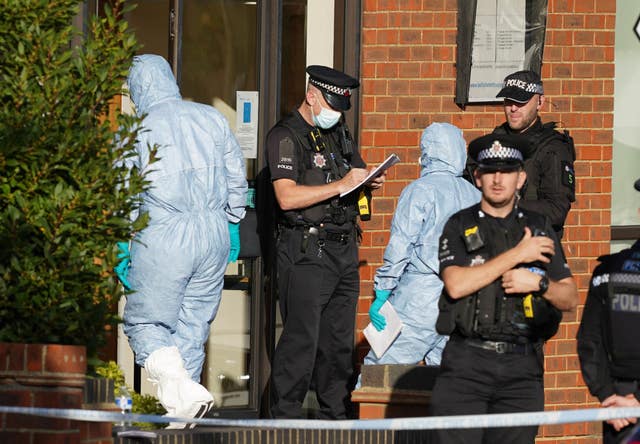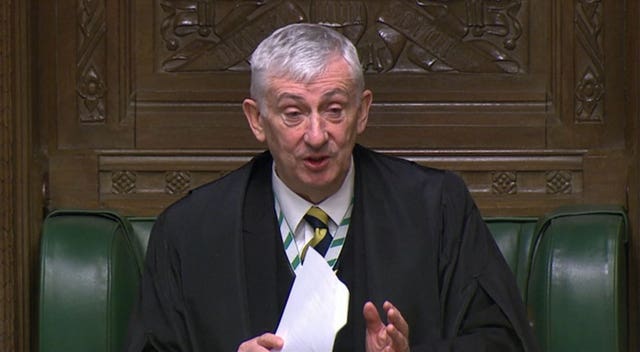Home Secretary Priti Patel has ordered an immediate review of MPs’ security following the killing of Sir David Amess while meeting constituents.
Ms Patel met police and representatives of the security and intelligence agencies after the 69-year-old MP was fatally stabbed as he held a surgery in his Southend West constituency.
A spokesman for the Home Secretary said that she had also spoken to the Commons Speaker Sir Lindsay Hoyle.
Questions are rightly being asked about the safety of our country's elected representatives and I will provide updates in due course. My heartfelt thoughts and prayers are with David's family and friends.
— Priti Patel (@pritipatel) October 15, 2021
“The Home Secretary has asked all police forces to review security arrangements for MPs with immediate effect and will provide updates in due course,” the spokesman said.
Earlier, Ms Patel said she was “devastated” by the loss of Sir David in what she described as an “attack on democracy itself”.
“That he was killed while going about his constituency duties is heartbreaking beyond words. It represents a senseless attack on democracy itself,” she said in a series of tweets.
“Questions are rightly being asked about the safety of our country’s elected representatives and I will provide updates in due course.”
The attack on Sir David death came just five-and-a-half years after Labour MP Jo Cox was killed by a far right extremist in her Batley and Spen constituency in West Yorkshire.

Sir Lindsay said that while it was right that security was reviewed following the latest incident, it was important to avoid “knee-jerk” reactions.
He said MPs needed to be able to carry on meeting their constituents which was an essential part of the democratic process.
“I am doing my surgery tonight. I recognise some MPs are not doing theirs. What we can’t do is give in to these people, people who don’t believe in our values, don’t believe in what we do,” he told BBC Radio 4’s PM programme.
“I believe the electorate needs to be able to communicate with the people who have been elected. It is part of our democratic process.
“We don’t want knee-jerk reaction. What we want to do is make sure MPs can carry out their duties. We have got to make sure MPs are safe.

“What we can’t have is people trying to stop MPs carrying out their duties. We will not and must not tolerate intimidation, threat, violence and at worst somebody being murdered again.”
His sentiments were echoed by the the Father of the House – the longest-serving sitting MP – Sir Peter Bottomley.
“I predict all over the country this weekend, next weekend and in the months to come MPs will hold advice sessions. That is what we do,” he told the PA news agency.
“There is no perfect security for anybody. My view has always been that in many other walks of life you are at far greater risk than a Member of Parliament.
“MPs may get exceptional publicity. We are not exceptional people. We’re ordinary people trying to an ordinary job as well as we. We accept the risks.
“The question is should MPs stop meeting their constituents face-to-face. The answer is we will go on meeting our constituents face-to-face.
“Often were are the last people who can help them when they are facing desperate troubles. Their needs, their interests come first.”
As well as the killing of Ms Cox in June 2016 in the days before the Brexit referendum, the attack on Sir David carried echoes of two earlier incidents when MPs were attacked in their constituencies.
In May 2010, East Ham MP Stephen Timms was stabbed twice in the abdomen by Roshonara Choudhry, an Islamic extremist who claimed she had wanted “to get revenge for the people of Iraq”.
Mr Timms suffered serious injuries and according to police was “extremely fortunate not to have been killed”. He remains an MP.
Nigel Jones, then MP for Cheltenham, was severely injured in January 2000 when he was attacked in his offices by a man with a sword.
Andrew Pennington, a Gloucestershire county councillor, was killed in the same attack while trying to defend him.




Comments: Our rules
We want our comments to be a lively and valuable part of our community - a place where readers can debate and engage with the most important local issues. The ability to comment on our stories is a privilege, not a right, however, and that privilege may be withdrawn if it is abused or misused.
Please report any comments that break our rules.
Read the rules hereComments are closed on this article